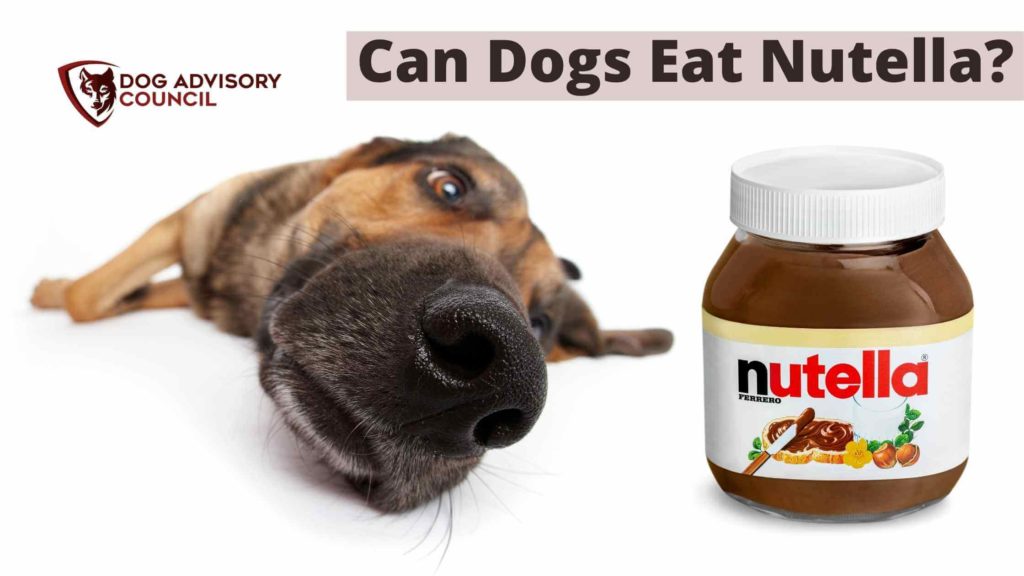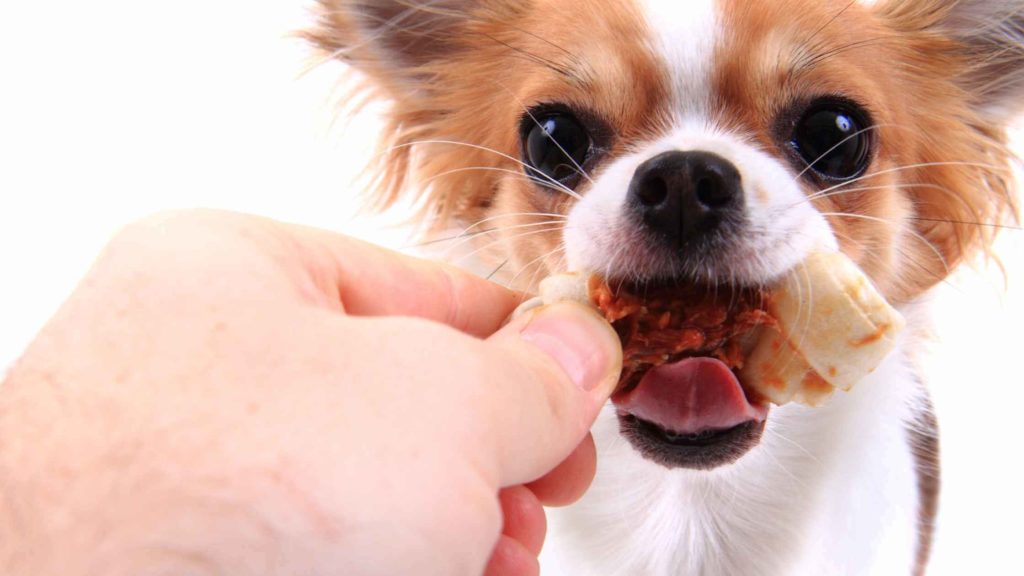
Most of us agree that a thick swipe of Nutella on toast is a great snack or breakfast food. But can dogs eat Nutella? Here’s what you need to know about sharing it with our dogs.
Nutella isn’t a healthy snack for dogs to eat, but the good news is considered safe in tiny amounts. All things considered, this shouldn’t ever be deliberately fed to your dog because there are many dangerous ingredients in Nutella for your dog’s short-term and long-term health.
Is Nutella dangerous for dogs?
There is some debate on this. Nutella is not immediately toxic to your dog, much to everyone’s relief. However, experts tend to be on both sides of this. Some see Nutella as very dangerous to dogs since it can cause serious health concerns if your dog absorbs it into their digestive tract.
Others firmly believe that a little bit of it is not the best idea in the world, but won’t cause any harm. So, what’s the verdict? Most will agree that Nutella can range from a bad idea for a snack to downright dangerous.
What does that mean for your dog? Let’s take a look at the details, and you can use those to determine just where you sit on the debate.
What are the dangers of Nutella?
There are three main concerns when it comes to Nutella and dogs. These are where the danger lies, and it’s also where most experts disagree. Mainly in picking how much is “too much” versus “safe, but not recommended.” These include:
- Theobromine
- Fat content
- Sugar content
Theobromine
This is the active ingredient in both coffee and chocolate that is toxic in dogs. Nutella naturally contains very little of it, so some experts feel that there isn’t enough to cause harm to your dog. Even a small amount of Theobromine can cause a toxic reaction in dogs. Consideration factors include your dog’s size, health, and the amount of Nutella.
Fat content
Nutella is loaded with fat. Since we eat it in small amounts (typically) and enjoy it as a treat, it doesn’t cause much harm to us. Our bodies also receive fat content better than dogs because of the size difference and our nutritional profiles. Dogs eat naturally low-fat diets.
Nutella is extremely rich in fat, and the amount dogs eat would be triple what we would when you work out that math. What does that mean? Nutella is highly fatty to our dogs. It can cause health issues such as obesity, poor nutrition, and more chronic, short-term concerns.
Sugar content
Even to our tastes, Nutella is sickly sweet. That’s a huge part of why it’s a delicious addition to bread. Much like with the fat content, dogs have a much lower tolerance for sugar, and Nutella will blow past that safe amount even in small amounts. This, too, can cause issues with obesity and even trigger pancreatitis. We’ll get into the details on health conditions a little later.
Nutella is not a good snack for dogs because it holds all of these genuine and severe health risks, and there’s absolutely nothing good in it for your dog instead of flavor.
Does Nutella have xylitol?
Xylitol is an artificial sweetener used in many human products to help reduce the amount of natural sugar in the product. Traditionally, Nutella doesn’t contain the xylitol since it’s not advertised as a sugar-free toping.
However, this sweetener is getting more and more popular as time goes on. Human brands don’t need to advertise using this sweetener since it’s not dangerous in humans.
Even a very small amount of sweetener can cause irreversible damage to your dog, and it can be fatal. Before you even consider giving your dog Nutella, you’ll want to guarantee that there is no xylitol in it. This is especially important if you are looking at “low sugar” Nutella or an off-brand or store brand version!
Can Nutella kill a dog?
A tiny amount of Nutella shouldn’t kill your dog since it’s a tiny amount of all of those active ingredients, and your dog is large enough to tolerate them (except for xylitol).
Nutella is capable of killing your dog, depending on the amount, active ingredients, and your dog’s acceptance of them, though. You’ll want to prepare yourself to watch for signs of problems just in case you need to get them to the vet.
How much Nutella can a dog eat?
This depends on the size of your dog and the type of Nutella. Generally, dogs can eat a tablespoon coated in Nutella. Or a dollop that falls to the floor without concern. However, licking their way through a jar will always be a reason for concern. In essence: the more they eat, the more likely they have problems and reactions.
My dog ate half a Nutella sandwich – Should I worry?
Dogs are sneaky creatures. If you’re here because your dog scarfed down half your sandwich without your permission, it’s normal to be feeling fearful based on what you’ve read.
If your dog has eaten half of your sandwich, the best thing that you can do is call your vet and let them know what’s happened. They will be able to tell you problem signs to watch for and can give you some in-depth support because they’ll know your dog’s medical history.
Depending on the information that you give them, your vet may ask you to bring your dog in for a check-up. If they recommend this, it’s a good idea to take that advice. If this is the case, be prepared by having:
- The complete list of ingredients of your Nutella
- An estimate of how much your dog ate (round up, if needed)
- Any reactions that you’ve noticed in your dog
All of this information will help your vet treat your dog safely, quickly, and effectively for the best outcome. The thing to remember is that your vet will recommend that you bring your dog in if they fear that they are showing dangerous signs that could mean a medical emergency. We’ve discussed this below for you.
Symptoms to look for if my dog ate Nutella
Nutella can cause the onset of some serious and potentially life-threatening conditions if they eat enough of it. They are below, as well as the symptoms to watch for each.
- Gastroenteritis
- Pancreatitis
- CNS damage
Gastroenteritis
This is the medical term for when your dog’s stomach and intestines get inflamed. Certain foods can cause this and, while it sounds simple, can be severe. If not treated properly, they can have lifelong stomach and gut health concerns. Symptoms include:
- Vomiting
- Diarrhea
- Dry-heaving
- Lethargy
- Dehydration
If caught in time, treatment is fast and effective for dogs. It involves balancing electrolytes and helping your dog’s system “calm down.” Most dogs recover very quickly.
Pancreatitis
There are two types of pancreatitis, acute and chronic. Acute pancreatitis is when a dog’s pancreas can’t balance its metabolism and blood glucose levels. It can become inflamed from eating too much fat and sugar, and it will be unable to regulate those crucial functions in your dog.
The symptoms are the same as gastroenteritis above. This is why a professional check-up is often the way to go since your vet can determine what’s going on and how to treat it effectively.
Pancreatitis can be fatal if left untreated. It can cause an onset of diabetes and worsen other chronic health conditions if it doesn’t get treated in time. Pancreatitis is always a serious health emergency in dogs.
CNS damage
Theobromine can impact your dog’s Central Nervous System (CNS). That’s why it takes so little of it to cause permanent damage to your dog. Since your dog’s CNS is vital to your dog’s organs, any damage to this can be life-threatening very quickly. Symptoms include:
- Shakiness/trembling
- Unsteady and/or racing heartbeat
- Seizures
- Loss of consciousness
- Difficulty breathing
Any time you notice any of these symptoms, you must immediately get your dog to a vet. It is always a medical emergency. The sooner that a vet can see your dog, the better they can help intervene and save their life.

Nutella alternatives for dogs
If you’re feeling a little freaked out now about intentionally giving your dog Nutella, you’re not alone! Even those who don’t think that Nutella is necessarily dangerous for dogs won’t recommend intentionally feeding it as a treat. There are tonnes of pet-safe alternatives to consider.
The best one that dogs love even more than Nutella is — you guessed it — peanut butter! You can get chunky or smooth, thick and thin, etc. Dogs love it, and it’s safe for them to enjoy in small servings in place of Nutella. You will want to double-check the list of ingredients for that sneaky xylitol, of course, but peanut butter is a great choice.
Other kinds of nut butters are great, too. Your dog won’t notice the difference, and it’ll be a huge weight off your mind!
In general
Nutella can be safe ins small servings for your dog, but it should never be given to your dog intentionally as a snack.
It can lead to stomach issues pancreatitis and even be fatal if reactions are left untreated. It’s best to know the signs of all of these and consider safe alternatives.
Nutella is arguably safe in small servings for dogs, but it’s not recommended for all of the reasons listed above.
Know someone who enjoys sharing this chocolate spread with their dogs? Share this with them to help keep everyone safe!
